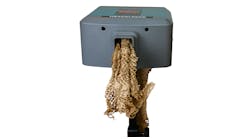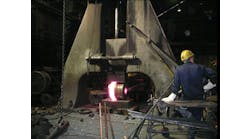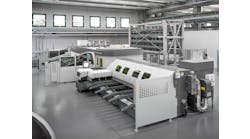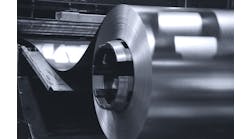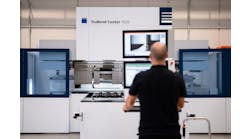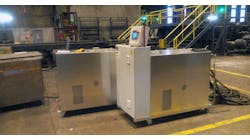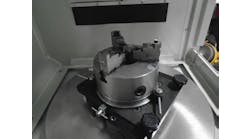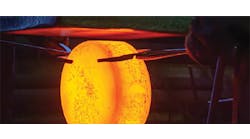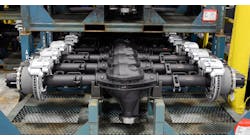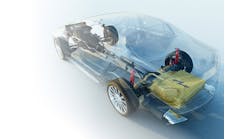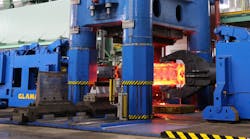Hitachi Metals Ltd. issued its final acceptance certificate for a new open-die forging press designed and built by SMS group, following a commissioning sequence. The 90/108 MN open-die machine at Yasugi Works in Japan reportedly is the largest four-column open-die press in push-down design built by SMS in the past 25 years.
The machine is designed to deliver a forging force of 90 MN (9,177.4 mt-force) and an upsetting force of 108 MN (11,012.9 mt-force.) Hitachi Metals will forge flat and round bars from ingots up to 30 mt, in temperature-sensitive materials like titanium alloys, tool steels, high speed steels, and nickel-based alloys.
Two rail-bound manipulators position the forgings with "millimeter precision," according to the developer, and move them in full synchronization with the press stroke.
SMS described a high-efficiency, space-saving hydraulic system concept involving 18 high-performance hydraulic pumps installed in the four-column, push-down press. A twin-pump arrangement (two pumps operated by one motor) means the hydraulic system requires significantly less space than otherwise would be necessary.
In response to Hitachi Metals request for fast-tool change capability on the press, SMS group developed a tool-changing system by which only the die track needs to be replaced. The entire tool changing process is performed fully automatically. The scope of supply for the press also included a table shifting device, a die shifting device, and a die magazine.
Another technical feature is a three-dimensional laser measuring system that measures the surface temperature and the geometry of the forging in real time, and optimizes pass schedules for homogeneous forging of the core zone.
Hitachi also adopted the SMS ForgeBase® control software for optimized, reproducible forging results. It offers models for producing precision forged parts cost-efficiently, based on predetermined pass schedules. Press operators are able to switch from fully automatic to semi-automatic or manual mode, as required.
The press was built on a vibration-isolating foundation consisting of an intermediate footing and several vibration dampers. Residual vibration measured at a reference point meets Hitachi Metals’ specifications, and the horizontal stoppers installed on the sides give extra stability (in case of earthquakes, the developer noted.)
